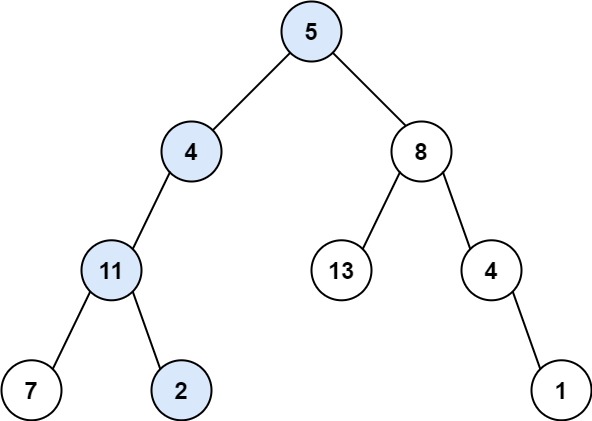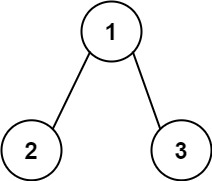117 lines
2.8 KiB
Markdown
117 lines
2.8 KiB
Markdown
# Leetcode Path-Sum
|
|
|
|
#### 2022-07-06 13:45
|
|
|
|
> ##### Algorithms:
|
|
> #algorithm #DFS #recursion
|
|
> ##### Data structures:
|
|
> #DS #binary_tree
|
|
> ##### Difficulty:
|
|
> #coding_problem #difficulty-easy
|
|
> ##### Additional tags:
|
|
> #leetcode
|
|
> ##### Revisions:
|
|
> N/A
|
|
|
|
##### Related topics:
|
|
##### Links:
|
|
- [Link to problem](https://leetcode.com/problems/path-sum/)
|
|
___
|
|
### Problem
|
|
|
|
Given the `root` of a binary tree and an integer `targetSum`, return `true` if the tree has a **root-to-leaf** path such that adding up all the values along the path equals `targetSum`.
|
|
|
|
A **leaf** is a node with no children.
|
|
|
|
#### Examples
|
|
|
|
**Example 1:**
|
|
|
|

|
|
|
|
**Input:** root = [5,4,8,11,null,13,4,7,2,null,null,null,1], targetSum = 22
|
|
**Output:** true
|
|
**Explanation:** The root-to-leaf path with the target sum is shown.
|
|
|
|
**Example 2:**
|
|
|
|

|
|
|
|
**Input:** root = [1,2,3], targetSum = 5
|
|
**Output:** false
|
|
**Explanation:** There two root-to-leaf paths in the tree:
|
|
(1 --> 2): The sum is 3.
|
|
(1 --> 3): The sum is 4.
|
|
There is no root-to-leaf path with sum = 5.
|
|
|
|
**Example 3:**
|
|
|
|
**Input:** root = [], targetSum = 0
|
|
**Output:** false
|
|
**Explanation:** Since the tree is empty, there are no root-to-leaf paths.
|
|
|
|
#### Constraints
|
|
|
|
- The number of nodes in the tree is in the range `[0, 5000]`.
|
|
- `-1000 <= Node.val <= 1000`
|
|
- `-1000 <= targetSum <= 1000`
|
|
|
|
### Thoughts
|
|
|
|
> [!summary]
|
|
> This is a #DFS recursion problem.
|
|
|
|
There are one thing to consider, return false when the tree is empty.
|
|
|
|
Simple DFS-like recursion problem.
|
|
|
|
Base cases:
|
|
- node is empty, return false
|
|
- node is leaf
|
|
- if the value is sum, return true
|
|
- else return false
|
|
|
|
Pseudo-code:
|
|
- Check for base-cases
|
|
- return check(left, sum - root->val) || check(right, sum - root->val)
|
|
|
|
> [!tip] Why use OR
|
|
> By using OR operator, return true when there is at least one solution that matches.
|
|
|
|
### Solution
|
|
|
|
```cpp
|
|
/**
|
|
* Definition for a binary tree node.
|
|
* struct TreeNode {
|
|
* int val;
|
|
* TreeNode *left;
|
|
* TreeNode *right;
|
|
* TreeNode() : val(0), left(nullptr), right(nullptr) {}
|
|
* TreeNode(int x) : val(x), left(nullptr), right(nullptr) {}
|
|
* TreeNode(int x, TreeNode *left, TreeNode *right) : val(x), left(left), right(right) {}
|
|
* };
|
|
*/
|
|
class Solution {
|
|
public:
|
|
bool hasPathSum(TreeNode* root, int targetSum) {
|
|
// DFS In-order Recursion
|
|
|
|
// Base case: node does not exist
|
|
if (!root) {
|
|
return false;
|
|
}
|
|
int val = root->val;
|
|
|
|
// Base case: reached leaf
|
|
if (!root->left && !root->right) {
|
|
if (targetSum == val)
|
|
return true;
|
|
else
|
|
return false;
|
|
}
|
|
|
|
return hasPathSum(root->left, targetSum - val) || hasPathSum(root->right, targetSum - val);
|
|
}
|
|
};
|
|
``` |